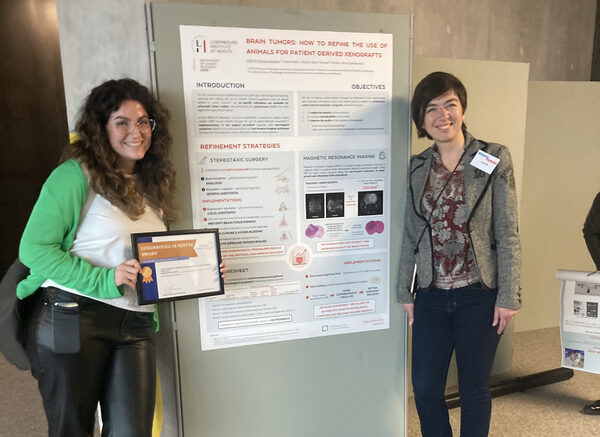News
FNR 2023 CORE Call preliminary results
Four LIH projects selected for funding

On November 8th, the Luxembourg National Research Fund (Fonds National de la Recherche – FNR) announced the preliminary results of its 2023 CORE Call. A total of 38 out of the 188 eligible proposals were retained for funding, corresponding to an FNR financial commitment of EUR 26.02 million. Among these are 4 projects involving the LIH, for a total financial support amounting to over EUR 2.5 million. Two additional LIH-led projects in collaboration with international partners are currently pending decisions from the partner funding agencies until end of 2023, while another LIH-led project is on the reserve list.
CORE is the central funding programme of the FNR, aiming to strengthen the scientific quality of Luxembourg’s public research and implement the country’s research priorities. The four LIH projects selected for funding under the “Personalised Healthcare” category address two of the National Research Priorities subcategories, namely “Complex biomedical systems – data and models” and “Precision medicine, including environmental, lifestyle and socioeconomic factors”. These in turn address the needs for novel multiscale and mechanistic models, innovative molecular disease models and for the identification of common mechanisms between diseases for patient stratification.
CRISCD8TERA (CRISPR screens in primary human CD8 central memory T cells identify regulators driving CD8 TEMRA differentiation), led by Dr Feng He of the LIH Department of Infection and Immunity (DII), will focus on a specific type of immune cells, namely the terminally differentiated effector memory CD8 T cells (CD8 TEMRA), which the team had previously shown to be dysregulated in various human diseases, such as Parkinson’s disease (PD) and Alzheimer’s diseases. As CD8 TEMRA only exist in humans and not in the widely-used animal models, there is still an important knowledge gap in many fundamental aspects, such as the detailed molecular mechanisms underlying their development/differentiation and the functional consequences of their dysregulation. The project therefore aims to advance the understanding of the differentiation mechanisms of CD8 T cells towards CD8 TEMRA by identifying regulators promoting or inhibiting the process, using large-scale CRISPR screening. Specific focus will be put on the discovery of the regulatory mechanisms underlying the dysfunctional CD8 TEMRA differentiation in PD. The project was funded with EUR 983,000 under the FNR call.
Through T3L2 (Translation as novel therapeutic target in leukaemia/lymphoma), Drs Etienne Moussay and Jérôme Paggetti of the LIH Department of Cancer Research (DOCR) aim to investigate the regulation of translation in chronic lymphocytic leukaemia (CLL) B cells and in the immune cells of their microenvironment, with the purpose of suggesting the targeted inhibition of leukemic and immunosuppressive cells. Moreover, the team will seek to determine how rewiring translation in Treg immune cells could improve the anti-tumour immune response. The scientists will also explore available clinical data in order to define biomarkers of response to current treatments and to translation inhibition, both in CLL and in Richter Transformation, the CLL-derived aggressive form of lymphoma. Finally, they will test inhibitors targeting different processes involved in translation in 2D/3D CLL patient samples, CLL pre-clinical models and PDX models of CLL/Richter syndrome. The project, which received EUR 830,000 in funding from the FNR, is co-financed by the Belgian Fonds de la Recherche Scientifique – FNRS.
NANO-SCOPE (Pre-operative methylation-based brain tumor classification), led by Dr Reka Toth of the LIH Bioinformatics platform, addresses the critical need for less invasive and faster diagnostic methods that can accurately distinguish central nervous system (CNS) tumours from other pathological entities. The genetic analysis of cell-free DNA (cfDNA) fragments released from apoptotic or necrotic cells detectable in bodily fluids is a non-invasive personalised way to diagnose and analyse tumours. However, an accurate method to establish a molecular diagnosis of CNS tumours before surgery is still missing. Therefore, the LIH team aims to develop a diagnostic tool using the DNA methylation pattern of cfDNA from cerebrospinal fluid (CSF) to molecularly classify brain tumours before surgery. This approach would enable neoadjuvant treatments, potentially improving prognosis and reducing the time to diagnosis. Additionally, a pre-operative diagnosis may allow patients to avoid unnecessary surgery. The project was awarded EUR 526,000 under the FNR call.
The Cancer Metabolism Group of the DOCR, led by Dr Johannes Meiser, is a partner in ReForMCaS (Regulation Of Formate Metabolism By Calcium Signalling In Cancer And Neurodegeneration). The project, led by the Luxembourg Centre for Systems Biomedicine (LCSB) of the University of Luxembourg, aims to investigate the role of calcium signalling in formate metabolism and its link to cell invasion and Parkinson’s Disease. Indeed, the dysregulation of formate, an important intermediate of the one-carbon metabolism and is an essential precursor in the biosynthesis of nucleotides, has been associated with cancer cell invasion, as well as PD, although the exact mechanisms remain elusive. The findings will subsequently also be validated in neurons obtained from PD patient-derived induced pluripotent stem cells. ReForMCaS was granted EUR 686,000 under the call.
Finally, it is noteworthy that two ongoing projects spearheaded by LIH in collaboration with international partners are currently awaiting decisions from funding agencies until the conclusion of 2023. Moreover, an additional LIH-led project stands poised on the reserve list. The final decisions will be communicated by the end of 2023.
We are very grateful to the FNR and the Fondation Cancer for unwaveringly supporting our research efforts across our priority disease areas. The funded projects all address clear clinical needs and are expected to provide concrete insights into disease mechanisms paving the way to new treatment and diagnostic approaches.
states Dr Frank Glod, Chief of Scientific Operations at LIH.
The complete list of projects funded by the 2023 FNR CORE call can be found here.







